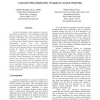Free Online Productivity Tools
i2Speak
i2Symbol
i2OCR
iTex2Img
iWeb2Print
iWeb2Shot
i2Type
iPdf2Split
iPdf2Merge
i2Bopomofo
i2Arabic
i2Style
i2Image
i2PDF
iLatex2Rtf
Sci2ools
105
click to vote
HICSS
2005
IEEE
2005
IEEE
Legal and Ethical Implications of Employee Location Monitoring
Location technologies allow employers to monitor the location of employees. The technologies range from global positioning systems able to determine outdoor locations worldwide to sensor networks able to determine locations within buildings. Few international laws and no American laws directly address location monitoring. International privacy laws, the Electronic Communications Privacy Act, the USA Patriot Act and other laws involving Internet and e-mail monitoring might provide the pattern for future location monitoring legislation. Ethical considerations such as privacy, accuracy, inconsistency, security, and reputation also may affect future legislation. In writing corporate policies governing location monitoring, the employer’s business interests may outweigh an employee’s privacy interest. However, privacy invasion may be considered when the employer’s monitoring has been physically invasive and has no legitimate business purpose. Future research should investigate managem...
Biometrics | HICSS 2005 | Location Monitoring | Location Monitoring Legislation | Privacy | System Sciences |
| Added | 24 Jun 2010 |
| Updated | 24 Jun 2010 |
| Type | Conference |
| Year | 2005 |
| Where | HICSS |
| Authors | Gundars Kaupins, Robert P. Minch |
Comments (0)

